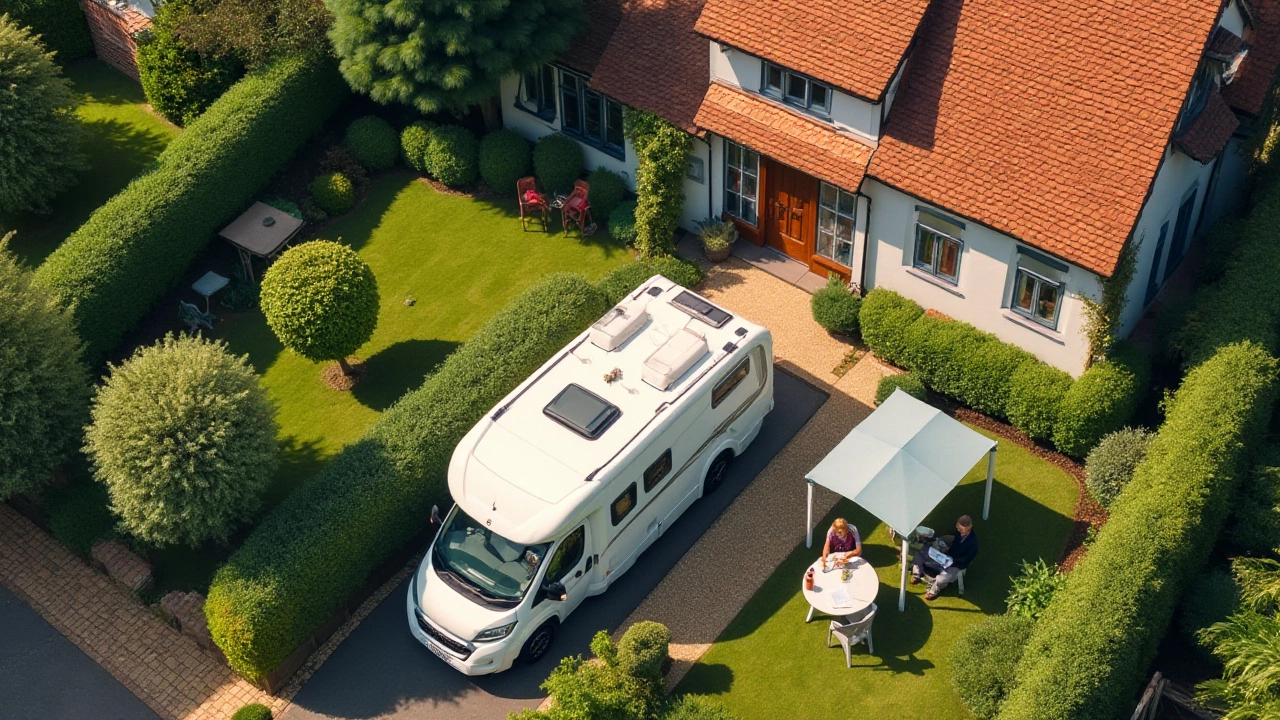When it comes to purchasing a home-on-wheels, understanding the ins and outs of financing options is crucial. Many folks wonder if RV loans bear any resemblance to traditional mortgages. While they might share some similarities, they are in fact distinct in many ways.
In this article, we'll dive into what sets RV loans apart from mortgages, exploring the terms, interest rates, and benefits that are specific to each. Whether you’re a seasoned traveler or a first-time buyer, gaining insight into these terms can make your journey smoother and more affordable. Let’s explore how you can navigate the world of RV financing with ease.
- Defining RV Loans and Mortgages
- Key Differences Between RV Loans and Mortgages
- Tax Implications
- Tips for Securing an RV Loan
Defining RV Loans and Mortgages
When setting out to buy a new RV, it's essential to understand what exactly an RV loan is and how it differs from a mortgage. Essentially, an RV loan is a specific type of financing that helps individuals purchase recreational vehicles, commonly known as RVs or motorhomes. These are often sizeable loans, resembling a mortgage in size, but they are typically considered personal or installment loans. In contrast, a mortgage is a secured loan specifically tied to real estate property, such as a house or land. This means that if the borrower defaults on a mortgage, the lender has the right to repossess the property.
Now, let’s talk about terms and conditions. RV loans often come with a shorter term compared to mortgages. Where home loans might stretch 15 to 30 years, RV loans usually range from 10 to 20 years, depending on the amount borrowed and lender preferences. Interest rates are generally higher for RV loans because they're seen as a higher risk than mortgages. Real estate typically increases in value over time, but vehicles depreciate, making them riskier investments for lenders.
Collateral and Security
An essential distinction lies in the collateral. With a mortgage, the purchased property secures the loan, and lenders feel confident because the property value is usually stable or increasing. In contrast, the RV itself secures an RV loan, and its value diminishes with time and use. This might lead lenders to impose stricter terms and often larger down payments are needed. In cases where the RV functions as a primary residence, tax implications might blur the lines a bit. The U.S. offers potential tax deductions on interest paid for an RV loan if the vehicle qualifies as a dwelling.
Statistics reveal a growing trend in RV ownership. According to the RV Industry Association, there are over 11 million RV-owning households in the U.S., reflecting an increase in demand and, consequently, RV loans. A noteworthy piece of advice comes from renowned financial planner, Dave Ramsey:
“RVs are really good for your soul; not so much for your wealth. Approach financing with caution and understand what you’re signing up for.”This highlights the importance of thoroughly understanding the loan terms before diving into this exciting purchase.
For those of you considering purchasing an RV for rental purposes, keep in mind that the financial implications of an RV loan might differ depending on your intended use of the vehicle. There are lenders who offer specialized loans based specifically on a rental model, where the income generated from renting out the RV couldn't just offset costs but potentially turn your RV into a profitable venture.

Key Differences Between RV Loans and Mortgages
Understanding the distinctions between RV loans and mortgages can help buyers navigate the waters of financing with a clearer head. At its core, an RV loan is designed to cater specifically to the purchase of recreational vehicles, while a mortgage pertains to real estate like homes and land. The fundamental difference lies in the asset being financed. RVs, though costly, typically aren’t as hefty an investment as most real estate properties, which impacts the terms and conditions of the loan agreement. This can be quite critical when considering which lending path to pursue.
One crucial difference lies in interest rates. Mortgages often come with lower interest rates compared to RV loans. This happens because real estate is a more stable and appreciable asset over time, offering lenders more security. RVs, on the other hand, depreciate like vehicles, influencing the interest rate accordingly. Lenders factored this risk, resulting in higher rates. This isn't just limited to interest: the length of the loan can drastically differ too. Mortgage periods usually stretch over 15 to 30 years, whereas RV loans typically range from 5 to 20 years. This means monthly payments can often be higher for RVs.
According to the National Association of RV Dealers, "Recreational vehicles are considered luxury items and, hence, come with financial stipulations divergent from real estate."
The process of qualifying for an RV loan can also be more stringent compared to mortgages. Lenders expect borrowers to possess a high credit score and a stable income history as RVs are seen as luxury purchases. The down payment can also be markedly higher for RVs. While homes might only need as little as 3% to 5% down, RVs could require up to 20%, depending on the financial institution involved.
Another defining difference comes in the form of tax implications. Mortgage loans often allow borrowers to deduct the interest on state and federal taxes. Such incentives are due to the primary residence nature of a mortgage. Some RV loans might offer similar deductions if certain criteria are met, such as the RV having facilities for sleeping, cooking, and sanitation, allowing it to be classified as a primary or secondary home. However, the financial perks mortgages offer remain unmatched.
Terms and Conditions
Looking at the terms and conditions also reveals noteworthy differences. Mortgages tend to have a more predictable and uniform set of rules due to strict real estate laws in the U.S. RV loans, however, can vary significantly depending on the lender. Interest type—whether fixed or variable— length of the loan, and associated fees all fluctuate considerably between different creditors. This variation necessitates potential buyers to shop around, seek expert advice, and possibly even consult with financial advisors before committing.
With significant differences ranging from financial implications to tax benefits, understanding the nuances between RV loans and mortgages is critical for making informed decisions. Keep in mind that choosing between the two often boils down to individual circumstances, needs, and broader financial goals. Knowing what each type of loan offers can make a world of difference on your journey to keys in hand—literally or on the road.

Tax Implications
Navigating the tax landscape associated with RV loans can be a journey of its own. Those unfamiliar with the intricacies of RV financing might find themselves pleasantly surprised by some of the benefits that overlap with traditional homeownership. In the United States, for instance, a recreational vehicle can sometimes qualify as a second home. This is provided that it has the necessary amenities, such as a sleeping area, bathroom, and cooking facilities. This classification can open doors to tax deductions similar to those available for primary residences, specifically concerning interest paid on the loan.
The potential deductions can be a significant financial advantage for RV owners, especially when the home mortgage interest deduction is considered. By classifying the RV as a second home, individuals may include the interest from their RV loan in their itemized deductions. It's a potential way to reduce taxable income, though it is always advisable to consult with a tax professional to ensure eligibility and proper filing. The IRS outlines these criteria in detail in their guidelines, which have seen tweaks and updates over the years.
Despite these benefits, it's important to maintain meticulous records of the RV's use, as spending too much time living in it instead of your primary residence can shift its classification, impacting potential deductions. The 2017 Tax Cuts and Jobs Act has also introduced changes in how interest from home equity lines of credit is handled, which indirectly affects RV loans.
The nuances between federal and state regulations can be vast, and it's crucial to understand local tax codes. Occasionally, personal anecdotes or advice from fellow RV enthusiasts can shed light on tax strategies worth considering. As one seasoned RV traveler shared,
"Owning an RV has not only been a lifestyle choice but a smart investment, thanks to the tax deductions attached to it. The key is keeping diligent records and consulting with your tax advisor."Engaging with such communities can offer firsthand insights into the real-world implications of RV ownership.
For those seeking comprehensive understanding, attending RV shows or finance workshops can introduce both novice and experienced RVers to specialists who offer tailored advice. Staying informed and ahead of changes in tax regulations ensures that you can enjoy the open road while maximizing the financial benefits of your motorhome financing.

Tips for Securing an RV Loan
Acquiring a recreational vehicle (RV) can be a thrilling endeavor for many. However, financing such a substantial purchase requires careful consideration and a strategic approach. Securing an RV loan is fundamentally different from obtaining a mortgage, yet both demand diligence and readiness. To make the process less daunting and more successful, there are a few key strategies you might want to keep in mind. First, know your credit score. Much like a mortgage, lenders will scrutinize your credit score to determine your eligibility and likely interest rates. A higher credit score not only boosts your chances of approval but might also snag you a lower interest rate on your RV loans.
Moreover, establishing a budget is crucial. It might sound basic, but understanding how an RV loan will fit into your financial life can make a tremendous difference. It's not just about the monthly payments—consider insurance, maintenance, and potential campsite fees, as these additional costs can quickly add up. Many advisors suggest allocating no more than 15% of your monthly income to vehicle expenses, including loan repayments. Researching different lenders is another vital step in the process. Contrary to the mortgage realm, a variety of lenders offer motorhome financing options, ranging from traditional banks to specialized RV lenders and even online financial services.
Shopping around can sometimes uncover more favorable terms or lower interest rates that you might not have found otherwise. While doing this, keep an eye out for seasonal promotions or lender partnerships with RV dealerships, which can offer financial perks or incentives when buying. While new adventurers may not know it, making a sizeable down payment can significantly affect the loan terms. A larger initial payment can reduce the loan's length as well as the amount borrowed, ultimately leading to substantial savings on interest. Most RV loan experts recommend putting down at least 20%, but more can often be better.
"A down payment is your commitment to the lender. The more you're willing to invest initially, the less risk you pose, which can translate to better loan conditions," mentions Jessica Turner, a financial advisor at RV Loans Direct.Another critical tip involves getting pre-approved for your loan. Not only does this provide a clear picture of your budget, but it also offers an edge when you're negotiating with dealers, showing that you're a serious buyer. Lastly, consider the loan term duration. Common wisdom suggests balancing a comfortable monthly payment with an interest rate you can live with. Longer terms mean smaller payments but often result in more interest paid over time. Scrutinizing the terms carefully can save substantial money in the long run.
If you're wondering how typical loans compare, it's interesting to note a quick overview of average rates as of the most recent data. Here's a simple comparison:
| Loan Type | Average Interest Rate |
|---|---|
| RV Loans | 4% - 7% |
| Mortgages | 2.5% - 3.5% |
By understanding these key tips and executing them diligently, you not only enhance your chances of securing favorable terms but also align the financing with your lifestyle, ensuring your journey into RV ownership is stress-free. With the right preparation, the road ahead holds nothing but promise, new horizons, and unforgettable memories.
